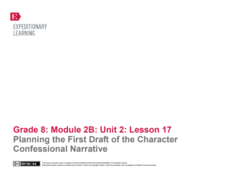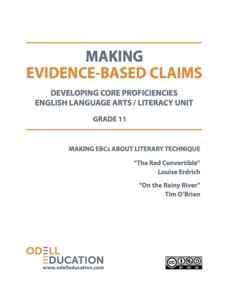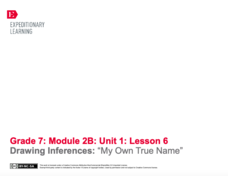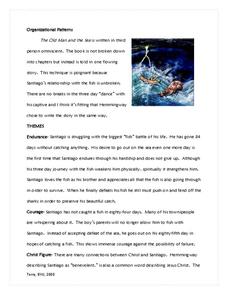EngageNY
Planning the First Draft of the Character Confessional Narrative
Scholars read and analyze a model character confessional narrative to help guide their writing. Then, they plan the first draft of a character confessional based on Shakespeare's A Midsummer Night's Dream.
EngageNY
Building Background Knowledge: The Pearl Harbor Attack: Unbroken, Pages 38–47
Perspective changes everything. Scholars use a close reading guide while analyzing pages 38-47 in Unbroken. Readers learn that the governments of Japan and the United States had very different perspectives about the attack on Pearl...
EngageNY
Making a Claim and Advocating Persuasively: Preparing for the Practice Fishbowl
Scholars consider their reading in The Omnivore's Dilemma to develop a claim answering the question, "Which food chain would you choose to feed your family—the local sustainable food chain or the hunter-gatherer food chain?" To guide...
Meadows Center for Preventing Educational Risk, University of Texas at Austin
Lesson 12 - Ed Suffix with Unchanging Base Words
Understanding different verb tenses begins with knowing how to decode words. A lesson on the -ed suffix with unchanging base words introduces readers to the past tense. Teachers present the skill with oral reading and spelling...
EngageNY
Understanding Interactions: Launching Pygmalion, Part 1
During a reading of one section of Pygmalion, individuals begin thinking more deeply about identity. They also complete text-dependent questions and a close reading guide.
EngageNY
Introduction: The Ideas of Charles Darwin
Piece by piece ... Scholars read the text World without Fish by breaking the text into pieces. They identify challenging words and determine the gist of each section as they read. They then work together in triads to answer...
Curated OER
Discussion Guide for The Catcher in the Rye
Is Holden Caulfield a trustworthy narrator? Groups work together to find evidence in The Catcher in the Rye to support a yes or no stance.
Curated OER
Author Study: Cynthia Rylant
Explore the life's work of one of the great children's authors using this ten-lesson author study unit. After first performing some whole-group research into the life of Cynthia Rylant, the class goes on to read six different stories,...
Have Fun Teaching
Making Inferences (19)
Good readers use what they know and clues found in a story to make inferences about what a writer wants readers to consider. Here's a graphic that supports this comprehension strategy and asks kids to record what they know, the clues...
ProCon
Drone Strikes Overseas
Should the United States continue the practice of using drone strikes abroad? Readers explore the top pro and con arguments in preparation for a debate or discussion about the topic. They read about the history of drone strikes, view a...
Odell Education
Making Evidence-Based Claims Literary Technique: Louise Erdrich and Tim O’Brien
Take a ride in The Red Convertible by Louise Erdrich. Students read the story and discuss whether a car is really a character. After carrying out several activities using graphic organizers and tools for making their claims in The Red...
EngageNY
Drawing Inferences: “My Own True Name”sl.7.1
How much are you worth? Scholars read text dependent questions, and discuss how the text relates to self worth. They then work with partners by having written conversation to make inferences about the text. For homework, pupils correct...
EngageNY
Tracing the Idea of Fish Depletion: Chapter 1
Would you, could you? Scholars read World without Fish and focus carefully on the use of the words could and would. They chunk the text into smaller sections and write annotations on sticky notes to help with comprehension. To finish,...
EngageNY
Introducing World without Fish
One fish, two fish, red fish, no fish. Scholars analyze World without Fish to determine the gist, identify vocabulary, and answer text-dependent questions. As learners read, they use sticky notes to annotate the text. They also work in...
Education World
Every Day Edit - Montgomery Bus Boycott
Develop editing skills every day with these Every-Day Edits! This bell-ringer focuses on Rosa Parks and the infamous Montgomery Bus Boycott. As they read, learners search for errors in punctuation, grammar, spelling, and capitalization.
Education World
Every-Day Edit: Author Jan Brett
Who was Jan Brett? As learners read this short passage to find out, they search for any errors in punctuation, spelling, capitalization, and grammar. The document contains two copies of the half-sheet edit, so half the printing is required!
Curated OER
Hatchet: Concept Analysis
Take an in-depth look into Gary Paulsen's Hatchet with a concept guide. With a list and explanation of thematic motifs, types of conflicts, and vocabulary in the novel, learners will engage with the text in a whole new way.
Curated OER
The Old Man and the Sea: Concept Analysis
Use a helpful concept analysis guide when planning your unit on Ernest Hemingway's The Old Man and the Sea. The resource covers plot elements, literary themes, and possible issues to address in order to make the work accessible to all of...
iCivics
Lesson 1: Journalism
Extra! Extra! Do your pupils know what it takes to be a good journalist? Young news hounds explore the world of journalism through a series of activities that focus on ethical reporting. Learners read, evaluate, and investigate popular...
iCivics
Lesson 2: Misinformation
Fake news is a hot topic right now ... but what is it? Intrepid young investigators track down the facts that separate journalistic mistakes and misinformation through reading, research, and discussion. Part three in a five-lesson series...
iCivics
Lesson 3: Bias
How do journalists balance bias and ethical reporting? The final activity in a series of five from iCivics examines the different types of bias and how they affect the news we read. Young reporters take to the Internet to find examples...
Meadows Center for Preventing Educational Risk, University of Texas at Austin
Lesson 17 - Adding Suffixes That Change Base Words' Finally to I
If it ends in a y, change the y to i when adding a suffix like -ness, -ly, or fy. The final lesson in the Word Recognition and Fluency series of 17 explains when to change the final letter in a base word to i before adding a suffix....
K12 Reader
Find the Abstract Nouns
A worksheet challenges scholars to read 20 words then identify and circle the 11 abstract nouns.
EngageNY
Studying Conflicting Interpretations: Perspectives on Plessy v. Ferguson: Part 3
Scholars closely read Justice John Marshall Harlan's dissenting opinion in the Plessy v. Ferguson case, seeking to understand why he disagreed with the court's decision that racial segregation laws for public spaces were constitutional....

























